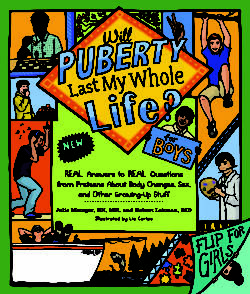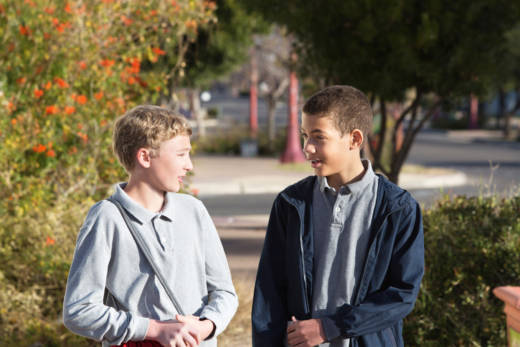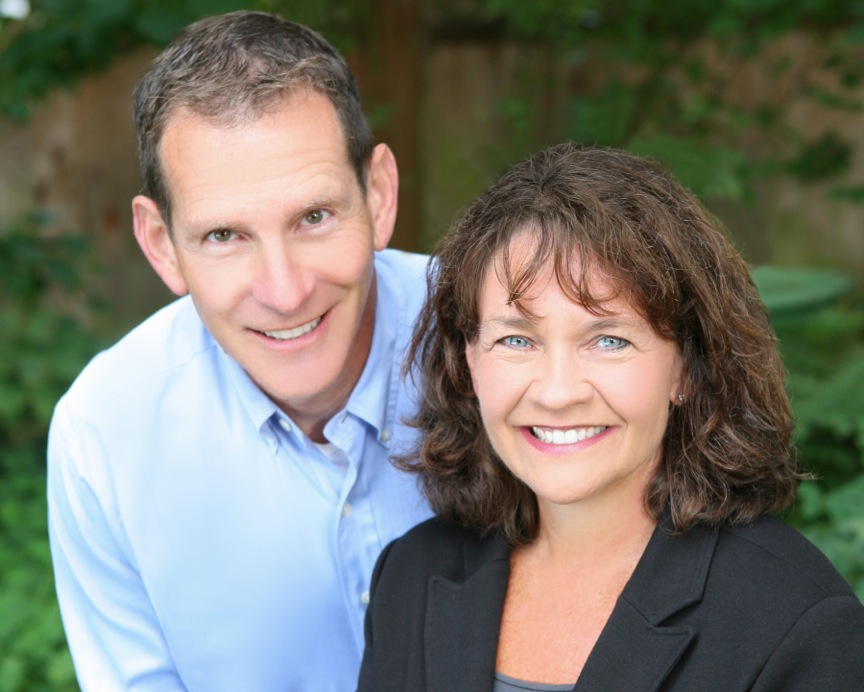Is it WEIRD going through puberty?
Some people wish they could stay just the way they were as kids, while others can’t wait to grow up. The thing is, everyone goes through puberty and has to experience the same changes. You might think that all this is weird because it’s new, but you can be certain that it’s normal—everyone else is doing it too.
I wonder when I will have PUBERTY. I wonder if it will be hard.
Most boys start puberty between the ages of ten and twelve, though a few can start earlier and a few later—and all of them are normal. The first thing you’ll see is pubic hair, the hair growing around your penis. The next place you’ll see hair is in your armpits, then on your arms, legs, and other places, with your full beard not coming in until much later. In the meantime, you’ll be growing taller, getting bigger muscles, and developing a lower voice. It might be confusing, surprising, or even astounding, but it’s not hard—it’s normal and everybody goes through it!
(Girls’ puberty is slightly different in timing and other things—for information, see the girls’ side!)
 What if I don’t feel like all the other boys?
What if I don’t feel like all the other boys?
There could be many reasons to feel that way. Sometimes it’s because you’re experiencing puberty earlier or later, or slower or faster than the other boys you know. You might feel different from them, even though you’re all normal. It could be because you’re attracted to boys, or both boys and girls, or no one right now. And sometimes, a kid who is born with boy reproductive parts doesn’t feel like a “boy” inside—maybe they feel more like a girl, or a mix of boy and girl, or maybe they feel really confused about the whole gender thing. When we feel different, we tend to keep those things to ourselves and worry about them a lot. Try talking to a trusted adult about what makes you feel different. You’ll probably find there are others who feel the same way as you. And that in itself can make you feel a whole lot better.
Can I still do things that I like to do (like building models)?
When your body—and the rest of you—grows up, you will naturally get interested in a lot of new things. Just because you add new interests doesn’t mean you have to lose all the old ones.
A question I have is how much will I be like my dad?
We inherit most of what we are from our birth mothers and birth fathers—hair color, height, foot size, good looks, and lots of other things—but we are a mix of both of their families. So some of us take after one more than the other and some of us look like a little bit of both. But we are more than just what we inherit. We are influenced by our friends, by what we learn, and by our experiences—all of these things help make us unique individuals.
Why is puberty so EMBARRASSING?
Maybe puberty feels embarrassing because it has a lot to do with our bodies, and there are some parts of our bodies that we don’t talk about very much, so it takes some getting used to. Maybe puberty feels embarrassing also because it’s new and because it happens no matter what. Hopefully, after reading all these questions asked by other kids your age, it will be a little less embarrassing for you.
Is it OK to talk about this with my friends?
You bet. In fact, show them this book! You should also talk about this stuff with your parents or other trusted adults in your life—after all, they’ve definitely gone through this themselves and can help you understand and get through the changes that are coming. They want this to go well for you. The more you talk about growing up and the more questions you ask about it, the less scary it will seem. Here’s a fun exercise you can do: ask a parent or other adult in your life to name three things that make them glad they’re grown up. The more adults you ask, the more things you’ll learn to look forward to as you grow up yourself.
How do you know if you’re NORMAL?
It’s normal to worry about whether you’re normal! Boys, men, girls, and women all think about this. Your friends might be a little ahead of or a little behind you as they progress through puberty, but “normal” includes all of these paths to growing up. Some boys look at their friends or other boys at school and wonder why they seem to be so far ahead in puberty, or why they look so different.
Throughout your preteen and teen years, you might see others who are taller or more muscular than you. Remember that the timing of puberty for you is set by what you inherit from your birth parents—not everyone starts at the same time or goes at the same speed. You could be the exact same age as another person but be at a different place in puberty. That’s OK—you’ll all be adults in time. This is a terrific example of being different but normal. And, if you’re one of those boys who is progressing a little later than his friends, the good news is that you might continue growing even after they’ve stopped. So you might wind up taller than them in the long run!
Will puberty last my WHOLE LIFE?




 Dr. Robert Lehman is an adolescent health specialist. He has devoted his career to providing direct health care services to youth, teaching health care professionals about the special needs of adolescents, and addressing teen health issues and policies on local, regional, and national levels.
Dr. Robert Lehman is an adolescent health specialist. He has devoted his career to providing direct health care services to youth, teaching health care professionals about the special needs of adolescents, and addressing teen health issues and policies on local, regional, and national levels.